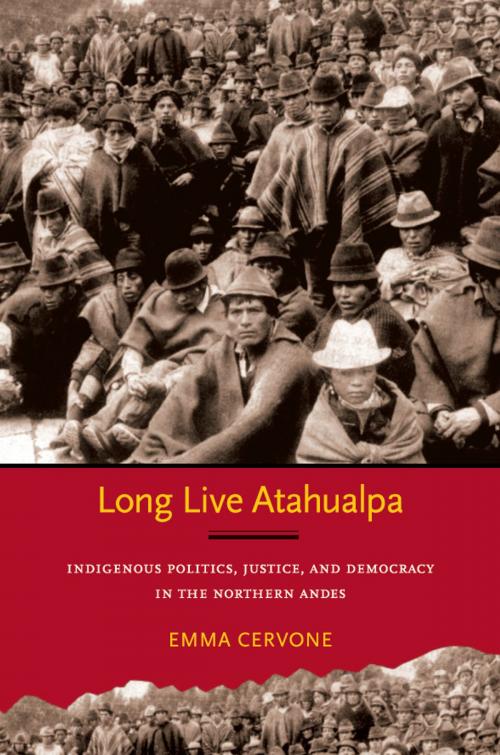Long Live Atahualpa
Indigenous Politics, Justice, and Democracy in the Northern Andes
Nonfiction, History, Americas, South America, Social & Cultural Studies, Social Science, Anthropology| Author: | Emma Cervone | ISBN: | 9780822395096 |
| Publisher: | Duke University Press | Publication: | May 7, 2012 |
| Imprint: | Duke University Press Books | Language: | English |
| Author: | Emma Cervone |
| ISBN: | 9780822395096 |
| Publisher: | Duke University Press |
| Publication: | May 7, 2012 |
| Imprint: | Duke University Press Books |
| Language: | English |
Long Live Atahualpa is an innovative ethnographic study of indigenous political movements against discrimination in modern Ecuador. Exploring the politicizing of Indianness—the right of indigenous peoples to self-determination and political agency—Emma Cervone analyzes how the Quichuas mobilized in the country's central Andean province of Chimborazo and formed their own grassroots organization, Inca Atahualpa. She illuminates the complex process that led indigenous activists to forge new alliances with the Catholic Church, NGOs, and regional indigenous organizations as she traces the region's social history since the emergence of a rural unionist movement in the 1950s.
Cervone describes how the Inca Atahualpa contested racial subordination by intervening in matters of resource distribution, justice, and cultural politics. Considering local indigenous politics and indigenous mobilization at the national and international levels, she explains how, beginning in the 1960s, state-led modernization created political openings by generating new economic formations and social categories. Long Live Atahualpa sheds new light on indigenous peoples operating at the crossroads of global capitalism and neoliberal reforms as they redefine historically rooted relationships of subordination.
Long Live Atahualpa is an innovative ethnographic study of indigenous political movements against discrimination in modern Ecuador. Exploring the politicizing of Indianness—the right of indigenous peoples to self-determination and political agency—Emma Cervone analyzes how the Quichuas mobilized in the country's central Andean province of Chimborazo and formed their own grassroots organization, Inca Atahualpa. She illuminates the complex process that led indigenous activists to forge new alliances with the Catholic Church, NGOs, and regional indigenous organizations as she traces the region's social history since the emergence of a rural unionist movement in the 1950s.
Cervone describes how the Inca Atahualpa contested racial subordination by intervening in matters of resource distribution, justice, and cultural politics. Considering local indigenous politics and indigenous mobilization at the national and international levels, she explains how, beginning in the 1960s, state-led modernization created political openings by generating new economic formations and social categories. Long Live Atahualpa sheds new light on indigenous peoples operating at the crossroads of global capitalism and neoliberal reforms as they redefine historically rooted relationships of subordination.















